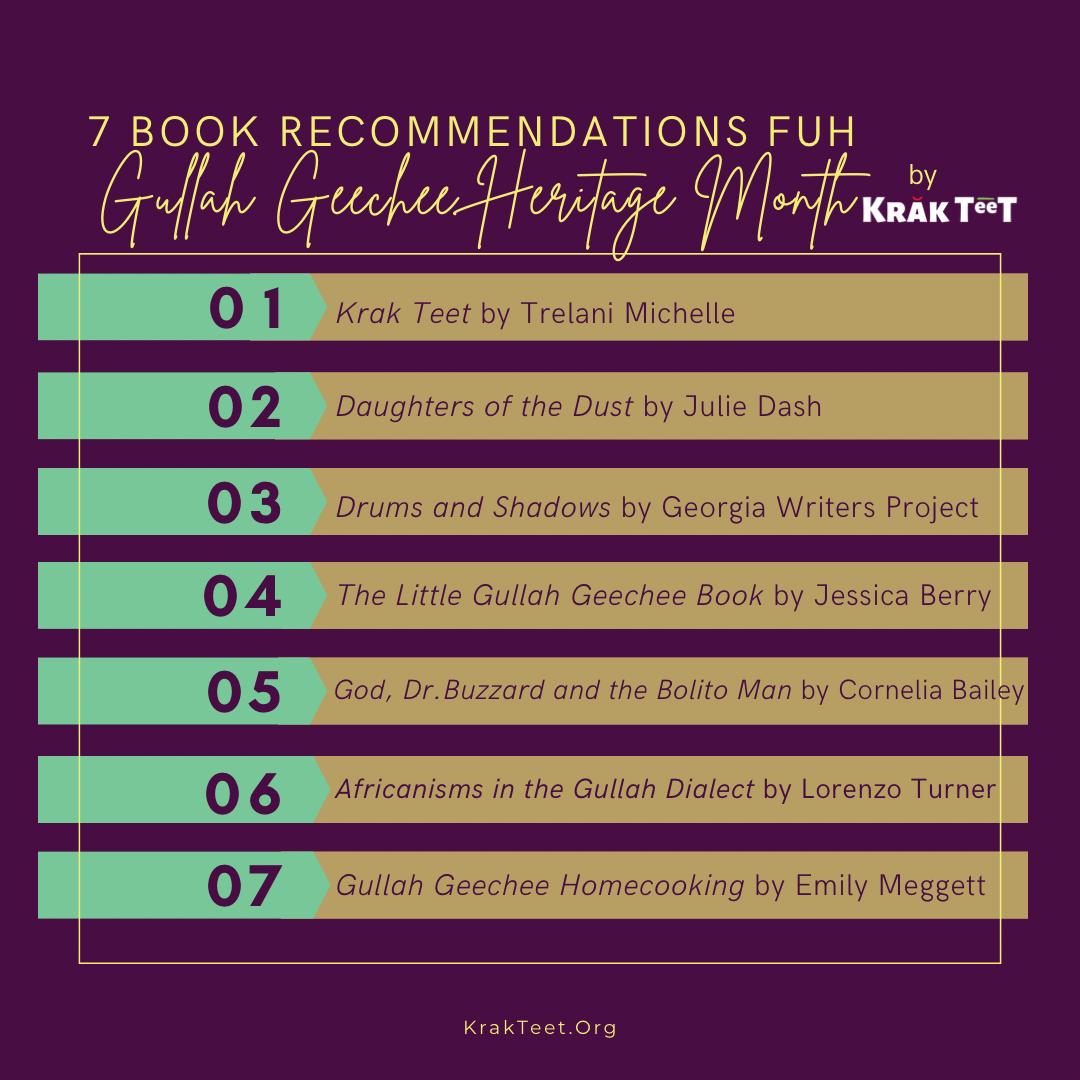7 Books on Gullah Geechee Culture

Krak Teet by Trelani Michelle
The first-hand accounts in this book are transcribed directly from the grandchildren of the enslaved who laid the city’s treasured cobblestone roads and introduced its famous red rice and deviled crabs. Those who lived through what can be considered the country’s second wave of the #BlackLivesMatter movement. Krak Teet catalogs stories of struggle—Ms. Madie’s family of sharecroppers fleeing after her father sold a pig without permission, Mr. Roosevelt stuffing his mother’s stab wounds with cobweb to stop the bleeding, and Ms. Florie marching Broughton Street twice a day to protest segregation—alongside stories of success—Queen Elizabeth Butler becoming Savannah’s first black woman to own a car, Ms. Sadie making over $500 a week running numbers, and the city’s desegregation eight months before the Civil Rights Act passed. Purchase here.
Daughters of the Dust by Julie Dash
Set in the 1920s in the Sea Islands off the Carolina coast where the Gullah-Geechee people have preserved much of their African heritage and language, Daughters of the Dust chronicles the lives of the Peazants, a large, proud family who trace their origins to the Ibo, who were enslaved and brought to the islands more than 100 years earlier. Native New Yorker and anthropology student Amelia Peazant has always known about her grandmother and mother’s homeland of Dawtuh Island, though she’s never understood why her family remains there, cut off from modern society. But when an opportunity arises for Amelia to head to the island to study her ancestry for her thesis, she is surprised by what she discovers. The more she learns, the more Amelia comes to treasure her family and their traditions. Daughters of the Dust blends folktales, history, and anthropology to tell a powerful and emotional story of homecoming, the reclamation of cultural heritage, and the enduring bonds of family.
Drums and Shadows by Georgia Writer’s Project
Drums and Shadows traces the persistence of African heritage in the culture of blacks living on the Georgia coast in the 1930s. In the later years of the depression, members of the Georgia Writers’ Project visited and interviewed blacks, many of whose grandparents, smuggled into slavery as late as 1858, had passed on the customs and beliefs of their African past. Seeking evidence of African traditions, the project’s workers questioned the blacks about conjure―the curses and potions responsible for turns of luck, illnesses, and even death―about dreams that often determine the course of daily life, and about spirits and other apparitions as real as walking, breathing people. Purchase.
The Little Gullah Geechee Book by Jessica Berry
There is a hidden treasure on the tongues of Low-country natives. The melodic rhythm of the Gullah Geechee language still rings strong from the South Carolina inland regions to the Sea Island coasts. Whether you are a tourist traveling through the low-country corridor, a come ya who has made the low-country your new home, or a been ya who was born and raised under the moss of the beautiful oak trees, there is always something to learn about Gullah Geechee. This pocket-guide to the Gullah Geechee history, culture, and language will give you a brief introduction to a United States gem. Purchase.
God, Dr. Buzzard and the Bolito Man by Cornelia Bailey
Equal parts cultural history and memoir, God, Dr. Buzzard, and the Bolito Man recounts a traditional way of life—that of the Geechee of Sapelo Island—that is threatened by change, with stories that speak to our deepest notions of family, community, and a connection to one’s homeland. Purchase.
Africanism in the Gullah Dialect by Lorenzo Turner
A unique creole language spoken on the coastal islands and adjacent mainland of South Carolina and Georgia, Gullah existed as an isolated and largely ignored linguistic phenomenon until the publication of Lorenzo Dow Turner’s landmark volume Africanisms in the Gullah Dialect. In his classic treatise, Turner, the first professionally trained African American linguist, focused on a people whose language had long been misunderstood, lifted a shroud that had obscured the true history of Gullah, and demonstrated that it drew important linguistic features directly from the languages of West Africa. Purchase.
Gullah Geechee Homecoming by Emily Meggett
Meggett is a respected elder in the Gullah community of South Carolina. She has lived on the island all her life, and even at her age, still cooks for hundreds of people out of her hallowed home kitchen. Her house is a place of pilgrimage for anyone with an interest in Gullah Geechee food. Meggett’s Gullah food is rich and flavorful, though it is also often lighter and more seasonal than other types of Southern cooking. Heirloom rice, fresh-caught seafood, local game, and vegetables are key to her recipes for regional delicacies like fried oysters, collard greens, and stone-ground grits. This cookbook has snippets of the Meggett family history on Edisto Island, which stretches back into the 19th century. Meggett’s Gullah Geechee Home Cooking is a testament to the syncretism of West African and American cultures that makes her home of Edisto Island so unique. Purchase.

